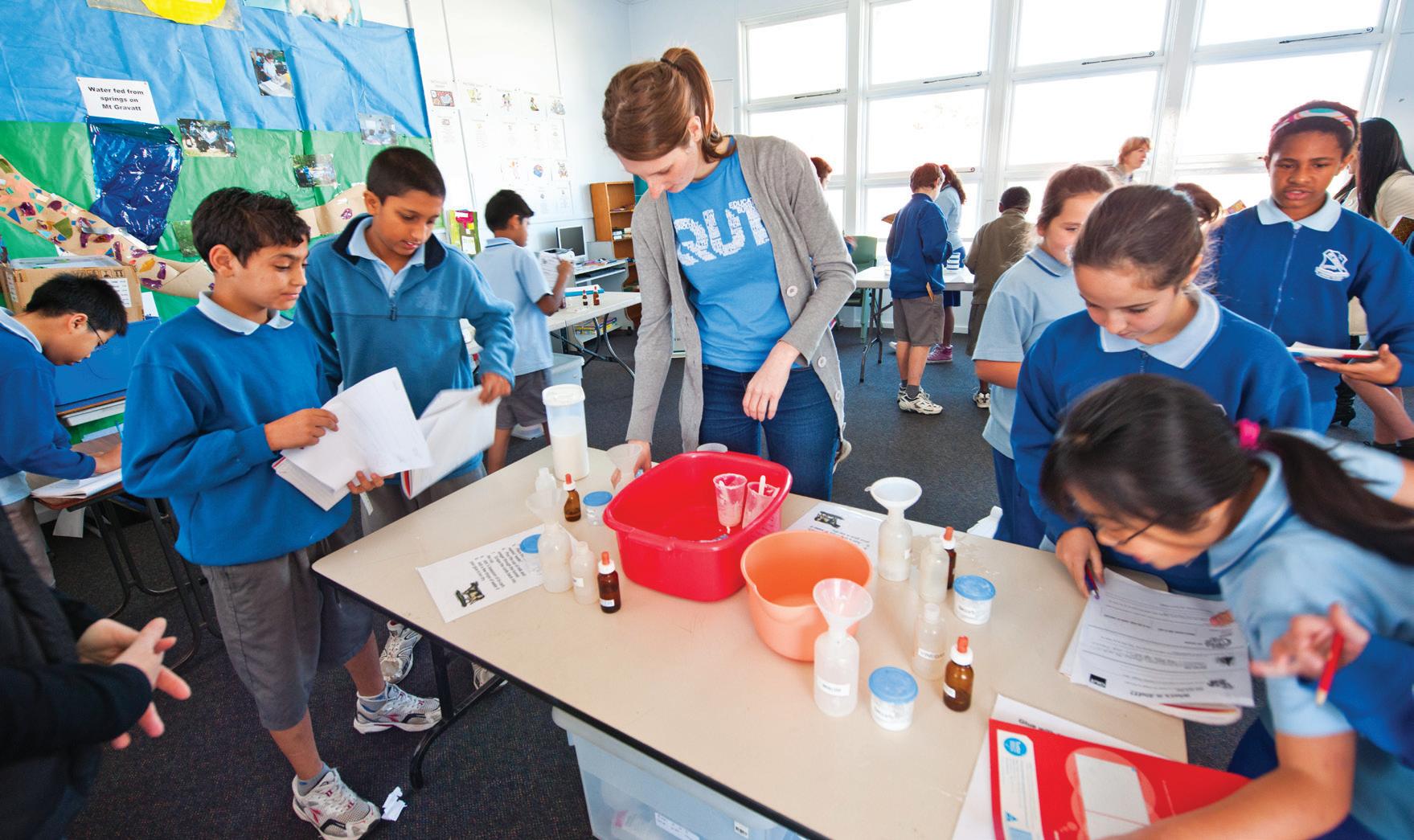
4 minute read
Queensland University of Technology
OUTREACH/PRE-ACCESS PRE-ACCESS ACCESS/PARTICIPATION ACCESS PARTICIPATION TRANSITION/ATTAINMENT ATTAINMENT/TRANSITION
EXPLORE UNI
Advertisement
DESCRIPTION
Explore Uni (EU) is Queensland University of Technology (QUT)’s signature Widening Participation (WP) program. It is a scaffolded program of residential camps and on-campus days immersing school students from low SES backgrounds in experiences that aim to: build aspiration for post-school study by building on students’ pre-existing strengths; shatter myths and misunderstandings about tertiary education; and boost students’ confidence by creating what Gale and Sellar have called ‘cultures of possibility’.
These are essential pre-conditions for informed post-school choices. Key program elements include tertiary student ambassadors sharing their personal narratives, an embedded career development component, and dynamic discipline-related workshops which bring future opportunities to life.
Partners: • 36 QUT primary and secondary partner schools • all six QUT faculties, Oodgeroo Unit, Library and Careers staff • The Smith Family, notably Learning for Life program staff.
OBJECTIVES
Many students from low SES backgrounds face barriers to tertiary participation due to the effects of intergenerational poverty and racism. Moving from being uninterested to actively interested in tertiary study is a journey, not a single revelatory experience, and involves issues of identity and imagination, not just information. This is why EU, offered to schools with low rates of progression to tertiary education, systematically addresses five conditions which must all be met before low SES students enter tertiary education:
““ awareness; aspiration; achievement; affordability; and access. The program is designed so students experience gradual growth in awareness, aspiration and capability through multiple engagements over time. ACTIVITIES AND PROGRESS 70 ambassadors—alumni from low SES schools and equity scholarship recipients—undertake a comprehensive training process which builds capacity, develops skills and enhances their sense of belonging. These student ambassadors now lead all aspects of the If I hadn’t attended an Explore Uni camp in Year 12 I wouldn’t be at uni today ... Hearing the Ambassadors’ stories made me realise some people had overcome far greater obstacles than mine and made it to uni; therefore I could too. personal contact with student ambassador role models. Queensland Tertiary Admissions Centre (QTAC) applications data indicates that interest in tertiary education is being stimulated. University applications from QUT target schools increased by 20 per cent between 2011 and 2016 (compared with a 15.8 per cent increase across all Queensland schools). In addition, 56.5 per cent – Explore Uni camp attendee EU program. The program also benefits from faculty staff of EU camp attendees made tertiary applications via QTAC.
HEPPP funding enabled QUT to expand its pre-existing EU collaboration. Seventy engaging hands-on, ambassador-led, program, which was only offered to small numbers of senior discipline-related activities have been developed, ranging from SUSTAINABLE IMPACTS students. Whole class cohorts now participate in several on- engineering to dance, from mock law trials to slam poetry, and campus experiences as they progress from Year 6 to Year 12. from optometry to business entrepreneurship. All are age- It is the power of partnerships that maximises the program’s
Approximately 7,000 students from 36 partner schools attend appropriate and linked to related study and career opportunities. effectiveness. Over the last five years, trusting and respectful one of 40 EU days or four residential camps annually. relationships have developed across QUT faculties and divisions, The on-campus career development component has more and with participating low SES schools. QUT staff have formed
Storytelling by student role models demystifies university recently been reinforced by in-school activities (in response a community of practice based on a shared vision. The program and the people who go there. These ambassadors use to teachers’ feedback) to deepen and consolidate learnings. has evolved as a result of deepening school, student and prevalent myths about tertiary education to frame their These include the development of pre- and post-EU Career university collaboration. personal ‘success’ stories; real students telling real stories Conversation resources and in-school tertiary admissions incorporating real fears and real solutions. The approximately and career sessions. School staff consider the program has positively influenced school culture. It also appears to have a ripple effect with peers
The pre-tertiary scaffolded journey for school-age low-income and Indigenous students OUTCOMES and family, as evident when the student quoted above concluded:
QUT’s contribution demystification; role models; curriculum enhancement; pathways/access
No family history of tertiary participation AWARENESS ASPIRATION ACHIEVEMENT AFFORDABILITY ACCESS
Year 6/7 Year 8/9 Year 10 Year 11/12
Connecting personal interest with study and future jobs
Developing choices/options around subject selection, goals and future jobs
Career exploration− connections between study, careers and pathways
Choices and transitions about study and work
School, family and community influences: values and identity; approach to learning; self-confidence; school success and completion
Interested in tertiary study and making informed choices Student and teacher feedback demonstrates that the program debunks myths, particularly the myths that ‘people like me don’t go to university’ and ‘it’s too expensive’, and builds aspiration for post-school study. Students and teachers consider that the program’s success arises from the opportunity to experience the campus first-hand, and the “My brothers aged three and four tell me they are going to uni when they are older, just like me!”
Students who attended EU days and camps as school students and were inspired by QUT ambassadors have come full circle and are now the role models, inspiring the next generation of low SES students by visiting their old schools as ambassadors. It is the circular nature of student involvement coupled with strong partnerships and commitment to a shared vision that are the strongest sustainability factors.










